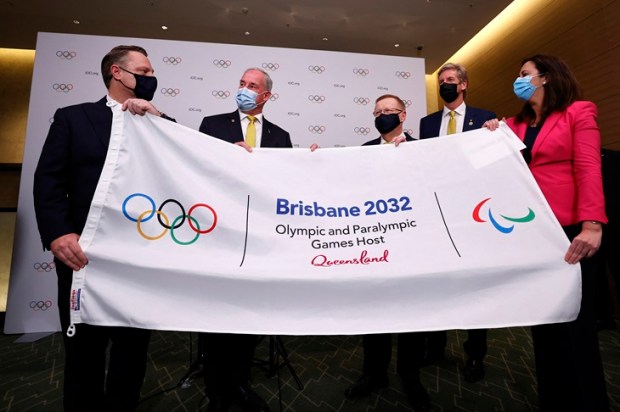The Peta principle
Sir: A besotted Richard Ferguson didn’t hold back on the superlatives in his pean to Peta Credlin (‘Peta, TV star’, 11 June), with ‘Amazonian warrior queen’ being the standout. Given that he also never misses an opportunity to dish out half-baked and insecure cheapshots against republicanism in this publication, I’d like to remind him that Peta Credin is also – reportedly – a republican, and that she might also have designs on becoming the first president/emperor/chair-thing/whatever of an Australian roopublic. I’d also suggest that if she’s such an unparalleled genius then Tony Abbott must’ve done the exact opposite of everything she advised him to do.
Russell Graham
Belmont, Vic
The population problem
Sir: Matthew Parris (11 June) dismisses worries over immigration as being based on race. This is a touch unfair. Although it would be misleading to deny that Brexiteers are concerned about cultural issues, especially when countries such as Albania are on the pathway to EU entry, there is also cause for concern over population density. England is already one of the most densely populated countries in the world, and the government’s own estimates (always an underestimate) show that the UK’s population increase (of which immigration would be a great part) will be half a million a year, equivalent to a city such as Leicester. This puts unsustainable pressure on traffic, schools, doctors, and housing. And all this is before the next four countries join the already bloated EU.
John Hatt
Sedbergh, Cumbria
Just buy the insurance
Sir: There have been some letters arguing that we should remain in the EU because EU citizens benefit from free access to health care in all member states. What do the writers suppose that people travelling outside the EU do? Depending on where they are going, they take out insurance. But that isn’t always necessary.
Last year I flew to Australia for a family wedding. I ended up in the Princess Alexandra Hospital in Brisbane, where I spent six weeks recovering from Guillain-Barré syndrome triggered by a tick bite from before I’d left the UK. The treatment was not cheap, but there was no suggestion that I’d have to pay, since Australia has a reciprocal arrangement with the UK. Besides the drugs, I had many hours of physio and occupational therapy. The hospital contacted both my GP and Aberdeen Royal Infirmary so that within a day of getting home I saw the neurological consultant in Aberdeen, who had details of all the treatment and the scans I’d had.
For all the reasons to stay in or to leave the EU, free health care should not be the most important. You can get excellent and free care in some countries outside the EU and for others, you should buy insurance.
Peter Richardson
Durris, Kincardinshire
Uniform campaigning
Sir: Charles Moore asks whether it is ‘legal, or professionally permitted, for officers, existing or former, to advocate a vote for anything while wearing the Queen’s uniform?’ (Notes, 11 June).
I don’t know the answer, but I am pretty sure it’s not a new phenomenon. Denis Healey’s poster for the 1945 general election described him as Major Healey and has a photo of him which looks as though he may be in uniform. He certainly campaigned in uniform. It may be that there was a dispensation in the 1945 election as of course many of those serving (as Healey did with great gallantry) had volunteered or been conscripted for the duration of the war only.
Julian Lloyd
Chester
A word about Pollock
Sir: When comparing Don Bradman with Alastair Cook, Christopher Booker (Letters, 11 June) may like to add a third player to his list: the young South African left-hander Graeme Pollock, who played his first Test at the age of 19 (against Australia in a 1963-64 tour by South Africa). He was nearly 26 when his Test career ended in 1970, through the sporting boycott of South Africa. During a seven-year period in which he played in 23 tests, he scored 2,256 runs at an average of 60.97. Bradman described Pollock, along with Sir Garfield Sobers, as the best left-handed batsman he had ever seen play cricket.
Ian Forsyth
Leighton Buzzard, Bedfordshire
Wrong end, Lady Chatterley
Sir: I fear David Silverman (Competition, 11 June) has made an error in cricketing continuity in his prizewinning entry ‘Lady Chatterley’s Over’. An over that consists of two dot balls, followed by a four, a six and a three, cannot then end with the batsman who faced the first five deliveries being dismissed caught at silly mid on, barring such oddities as the three being in fact an all-run four with one short.
James Hill
Swindon, Wiltshire
Presidential dynasties
Sir: Your leader writer and your diarist Lionel Shriver (11 June) ignore the major factor in the US election process, which is money. The dynasties which have emerged — the Kennedys, the Bushes, and the Clintons — are by no means representative of the best talents in that great country. Nor are property developers or lawyers or professional politicians and lobbyists. How is it that America’s greatest president since 1945 was the unknown VP and haberdasher Harry S. Truman (aided by General George C. Marshall), who took over when Roosevelt died?
Chris Minter
London SW6
The post Australian letters appeared first on The Spectator.
Got something to add? Join the discussion and comment below.
Get 10 issues for just $10
Subscribe to The Spectator Australia today for the next 10 magazine issues, plus full online access, for just $10.
You might disagree with half of it, but you’ll enjoy reading all of it. Try your first month for free, then just $2 a week for the remainder of your first year.


























Comments
Don't miss out
Join the conversation with other Spectator Australia readers. Subscribe to leave a comment.
SUBSCRIBEAlready a subscriber? Log in